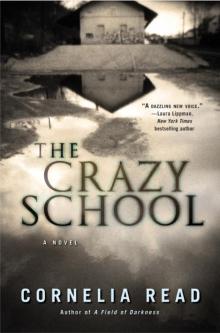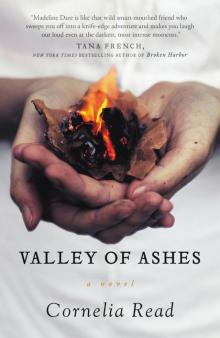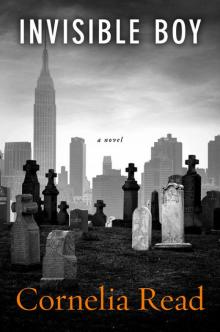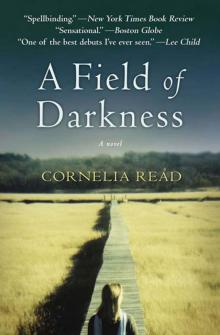- Home
- Cornelia Read
The Crazy School
The Crazy School Read online
This book is a work of fiction. Names, characters, place, and incidents are the product of the author’s imagination or are used fictitiously. Any resemblance to actual events, locales, or persons, living or dead, is coincidental.
Copyright © 2008 by Cornelia Read
All rights reserved. Except as permitted under the U.S. Copyright Act of 1976, no part of this publication may be reproduced, distributed, or transmitted in any form or by any means, or stored in a database or retrieval system, without the prior written permission of the publisher.
Grand Central Publishing
Hachette Book Group
237 Park Avenue
New York, NY 10017
Visit our Web site at www.HachetteBookGroup.com.
First eBook Edition: January 2008
10 9 8 7 6 5 4 3 2 1
Grand Central Publishing is a division of Hachette Book Group, Inc.
The Grand Central Publishing name and logo is a trademark of Hachette Book Group, Inc.
ISBN: 978-0-446-51110-0
Contents
Also by Cornelia Read
Dedication
Part I
1
2
3
4
5
6
7
8
9
10
11
12
Part II
13
14
Part III
15
16
17
18
19
20
21
Part IV
22
23
Part V
24
25
26
27
28
29
30
31
32
33
34
35
36
37
38
Part VI
39
40
Part VII
41
Acknowledgments
Also by Cornelia Read
A Field of Darkness
To all the kids who attended the Desisto School, especially those of you who were my students,thank you for all that you taught me.
Part I
Western Massachusetts, 1989
“As a matter of fact, I’ve always had a theory about anxiety. I’ve decided my anxiety always increases in direct proportion to the absence of Richard Nixon in my life.”
Julie began to smile. She knew where I was headed.
“When he was around, lying, cheating, trying to destroy the Constitution, I was furious, but I had no anxiety. Then he resigned in ’74, and I swear that’s when my anxiety got really bad. What’s more, I bet I’m not the only person who is walking around psychologically crippled by the absence of Richard Nixon in their lives.”
—Barbara Gordon
I’m Dancing as Fast as I Can
1
Halfway to Christmas, Forchetti stated the obvious: “You can’t teach for shit.”
The other six kids went quiet, looking from him to me—teen-angst scratching and hair twirling and pencil chewing arrested for once.
He cracked his gum, noise reverberating off the jaundice-yellow cinder block.
It was an ugly room. Demoralizing. I didn’t want to be in it, either, only you’re not supposed to say that when you’re the grown-up.
The trees outside were losing their last Robert Frost touches of burnished brass and copper—sorry leaves ready to drop from maples and elms and whatever the hell else kind of East Coast trees I still didn’t know the names of, twelve years after leaving California.
I dragged my eyes back from the window and crossed my arms. “Did you read the damn chapter?”
Forchetti smirked and pincered the spit-warm raisin of Juicy Fruit off his tongue. He held it up, pretending to sight down the damn thing, straight at my forehead.
I stared right back at his narrow face, at those baby features overwhelmed by black eyebrows he hadn’t yet grown into. “ Did you?”
Without looking down, Forchetti opened his copy of I Know Why the Caged Bird Sings at a random page. He dropped the little gum wad inside and mashed the paperback shut against his chair’s faux-wood paddle of desk.
“I wouldn’t read this piece of shit,” he said, “if you dropped to your knees and blew me.”
Wiesner hissed, “Shut the fuck up, Foreskin.”
Good-looking kid, Wiesner: six-five, white-blond hair slicked back, gray eyes with long dark lashes. He was just back from eight days in county lockup, after holding a teacher and a couple of students hostage with a carving knife so he could call his girlfriend long-distance on the principal’s office phone. Now I had him for two out of three classes.
Forchetti dropped his eyes to the carpet.
“She is a shitty teacher,” he whined, “and you owe a dollar to the Rape Crisis Fund for saying the F-word, Wiesner.”
Which was true. Big-time rule here at the Santangelo Academy, because Dr. David Santangelo felt that “fuck” was a word fundamentally linked to violence against women.
It was, in fact, the only word the students weren’t allowed to say. Or the teachers.
Wiesner pulled a crisp five from his pocket. “Four to go, then.” He lifted his right hand, waggling the digits in Forchetti’s direction.
“Madeline is not a fucking shitty teacher,” he said, folding his index finger down on the stressed word. “You, on the other hand, are a fucking”—middle finger—“suckbag fuck”—ring finger— “and if you don’t leave her alone, I’m going to fucking”—pinkie— “stomp your skinny ferret ass the next time I catch you alone in the showers.”
Wiesner wadded up the money and tossed it at Forchetti’s feet. “Be a sweetheart,” he said. “Put that in Santangelo’s little jar for me.”
Forchetti blushed, but he picked the bill up off the floor and put it in his pocket.
I would have told Wiesner to lay off threatening a foot-shorter kid he had fifty pounds on, except Patti Gonzaga started growling, which was what happened the first week, right before she chunked her chair at my head.
The lunch bell went off, thank God. They stampeded into the hallway, all except Wiesner, who just stretched his legs out, still in his seat and grinning.
One last door slammed down the hall.
He ambled over and sat on the edge of my desk. “Penny for your thoughts.”
“I think you’ll be late for lunch.”
“Figured I’d walk you over,” he said.
“I still have to do everybody’s marks.”
We were supposed to rate how each kid behaved, right at the end of class. Forchetti’d racked up three straight weeks of zeroes—winner and still champion.
Wiesner lounged back on an elbow. “I can wait.”
I pulled open the top drawer, looking for a pen. “They’ll get all pissed if you’re not there for the meds.”
“You just seem kind of shaky,” he said, voice all soothing. “I want to make sure you feel okay.”
The drawer was full of crap, souvenirs of my predecessors—paper clips, barrettes, dental floss, half a roll of TUMS, and a screwdriver.
Teachers left this place in a hurry.
Wiesner leaned over, perusing the contents.
I looked up. “Of course there isn’t a single fucking pen.”
He smiled, extracting a Bic from his jacket.
“Trade you for that screwdriver,” he said. “I need to make a phone call.”
Wiesner and I angled across the lawn toward the dining hall. I didn’t want to get there. I wanted to cut off into the woods and have a smoke
, alone, only I couldn’t because the other teachers would have smelled it on me and narked.
I shoved a hand deeper into the pocket of my leather jacket, fishing through its torn lining to grip my crumpled pack of Camel straights.
I hadn’t even thought about cigarettes since college. Now they were the focus of my existence, along with caffeine. We weren’t allowed to have that, either, which didn’t stop me from sucking down thick-walled cups of the tepid institutional decaf, hoping in vain they’d missed scrubbing the kick from a bean or two.
The Santangelo Academy air was crisp and fresh after a week of rain, edged with wood smoke and rotting leaves. There was even a sweet breath of cider drifting up from the weed-choked orchard, planted back when this had all been some Bostonian nouveau magnate’s country place, before the Civil War.
It was beautiful here in the Berkshires. I’d give it all that much.
“I like that Caged Bird book,” said Wiesner.
He was lying. I shouldn’t have cared.
“The lady who wrote it,” I said, “I knew her brother Bailey. He used to come to our house.”
I was going to tell Wiesner about this one time when I was little, maybe 1970, and Bailey saw me cutting dry rot out of a tree trunk in our backyard with a paring knife. He told me he’d bring me a switchblade as a present the next weekend he came down from Berkeley. Said he wanted to make sure I’d be okay “come the revolution,” since I was pretty hip for a white kid.
I never got the knife. He never got the revolution.
Wiesner nudged my upper arm with his fist and said, “So, d’you do him, her brother?”
“Chrissake, Wiesner . . .”
He grinned down at me. “Can’t kid a kidder.”
“I was, like, eight years old.”
“Sure,” he said, laughing now. “Sure you were.”
I stopped walking. “ Seriously,”
He gave me a pat on the head.
“What the hell kind of thing is that to even say?” I said, batting his hand away. “To anyone, let alone a teacher. I mean, would you pull that shit with Mindy or Gerald or Tim?”
“Do I look like an idiot?”
“So why me?”
“How about because you look good in that little skirt, and you’re blonde with green eyes, and you’re wearing cowboy boots, and it’s a gorgeous day.”
I rolled my eyes. Started walking away.
“Are you sure you want to know?” he asked, behind me now.
“Whatever.”
“Turn around.”
I sped up.
“Fine with me,” he said. “I’d just as soon check out your ass from here.”
I turned around.
Wiesner was still smiling.
“We’re late,” I said. “If you want to say something that’s not merely about pissing me off, I’ll give you ten seconds.”
He looked at the ground, a little embarrassed. “I say shit like that to you, Madeline, because I know I can, okay?”
I was touched. “Because you trust me.”
“No, because you’re too whacked to maintain appropriate boundaries.”
He raised his eyes again, but I looked away. At the trees and stuff.
I’d always despised the shrink-sponsored murder of language—all precision and metaphor and beauty boiled away until there was nothing left but carbonized lumps of jargon.
“You have issues around authority,” he continued. “I figure that’s why you’re here.”
“That’s why you’re here, Wiesner. I’m here because it’s a job.”
He shrugged. “When you’re ready to own your shit, you’ll know why you’re really here. That’s what this place does.”
“Cha,” I said. “‘Good for the disease.’”
“What the hell is that supposed to mean?”
“It’s from this book,” I said. “ Magic Mountain.”
“Books don’t help,” he said.
“You’d be surprised,” I said, even though I’d never managed to finish reading it myself, back at Sarah Lawrence.
He took my elbow and started us walking. “Can’t kid a kidder.”
Sometimes you can, Wiesner.
I was here because I’d killed a guy. And I owned the hell out of that.
The fact he’d been trying to kill me at the time hadn’t helped me sleep any better since.
Neither had this place.
2
The dining hall had the acoustics of a hockey rink, the voices of a hundred-something students and thirty-odd faculty bouncing between thin carpet and low curved ceiling.
I sat with the teachers. Wiesner didn’t.
The last open seat was next to Mindy, who was trying to explain to everyone around the circle of table how her TMJ was acting up again. She could barely open her mouth.
A friend of mine had that: temporomandibular-something-something.
“What does TMJ stand for again?” I asked.
Mindy turned and blinked at me, twice. “Tense mouth and jaw,” she said, pronouncing the first word “tints.”
“I’m so sorry you have to deal with that,” I said.
“Aren’t you sweet?” she said, blinking again, twice.
When not stricken with TMJ, Mindy chewed gum with her mouth open. She was from Ohio. Every inch of furniture surface throughout her campus apartment was jammed with stuffed animals, all of them pink. She’d brought the canopy bed her parents gave her as a sweet-sixteen present with her all the way from Dayton.
We couldn’t stand each other, but I hated her more. She was so shallow she couldn’t even dislike people properly.
I despised her receding chin and her stupid fluffy perm and her stupid fluffy pink sweaters and her fucking giggle. It made me happy that she was fat, since I’d dropped twenty pounds doing time at Santangelo, having been too fucked up to eat much of anything.
I pushed the little piles of lettuce and cottage cheese around my plate, just to annoy her.
“Don’t forget we have Sookie today right after lunch,” she said.
“Thank you, Mindy,” I said, “but I know we have Sookie today.”
I chose to believe that our mutual loathing wasn’t the reason the two of us got assigned to the same Santangelo therapist, though it wouldn’t have surprised me. We went twice a week for an hour, along with Tim.
Mindy turtled her head forward, talking across me. “I know you’ll remember, Tim. You’re not passive-aggressive, like some people.”
Blink. Blink.
Tim was a little guy, mostly harmless, with skin and hair so pale he was practically opaque.
Sookie reminded me of a golden retriever—big-pawed, blonde, and brimming with indiscriminate affection.
Everyone at the school had to do Santangelo-approved therapy—not just the kids but the teachers, the administrators, and the parents of every student. We did ours on campus. Santangelo had a traveling crew of shrinks who met with parents around the country. If they missed a session, they weren’t allowed contact with their kid by phone or mail for a month. I couldn’t believe that was legal, but they were desperate enough to suck it up without complaint.
They wanted to help their children get better—they wanted to believe Santangelo had the secret cure, that he’d fix everything so their kids could resist suicide, or heroin, or schizophrenia, or the urge to inhale fumes from glue and gasoline and hair spray and that stuff you spray on records to get the dust off.
I wanted to believe Santangelo could fix me, while he was at it. Who among us does not want to be shriven, to confess all, in the hope of being made clean and whole and new?
It’s just that I was second-generation at this, one of those kids dragged along for the ride by parents trying to achieve escape velocity at Esalen or Woodstock or, God help us, Jonestown.
Forage through the five-for-a-buck milk crate at any midlife suburban garage sale, and you’ll run across at least one of us in a photograph—captured frolicking, blond, and naked on some scratch
-hazed, blunt-cornered old album cover. Eat a Peach. McCartney.
We were the ideal, pretty babies poised to inherit their fresh Eden after the war, after Nixon, after all the world’s bitter, stupid old men stopped trying to pave paradise and put up parking lots and shit.
Not like I can blame my parents. Who wouldn’t have wanted to get out from under the black-hole physics of Levittown and Eisenhower, the whole Herb Alpert–Republican death trip?
So there I was, November 1989—Madeline Dare, age twenty-six and at a total loss, sitting on a hill in the Berkshires.
Locals called this Wifflehead Mountain: a single peak tucked into the lush hills and canyons just west of Stockbridge, a baby Matterhorn that had drawn to itself all manner of seekers and lost boys, wild girls and pagan sprites—a century-long parade of Adult Children with enough cash to kick and wail against the trammels of age and responsibility, mortality and the scientific method.
Santangelo’s “therapeutic boarding school” was just one facet of the primary native industry.
There was the yoga center where you could pay a thousand dollars a week to subsist on watery juice and sleep on a mat no thicker than a dish towel.
There were grand Georgian sanitariums that had dried out the country’s more artistic drunks and junkies, enough of whom stayed on to give the Berkshires a permanent bohemian foundation.
There was the detritus of untold communes and utopias—from the celibate Shakers, who’d died out through lack of breeding, to the wholly licentious latter-day acidheads who’d left behind nothing but their fleas and half-finished macramé plant hangers and lawnsful of broken major appliances.
Then there was this place, its stone gates surmounted by an ineptly welded arc of steel butterflies, mascots fluttering along the school motto: “Free to Be.”
I pushed away my untasted salad and reached for the jug of fake coffee, suddenly exhausted.
Mindy put her arm across my shoulders. “Are you going to talk to Sookie about your issues around food?” she whispered sweetly.
“Are you going to talk to her about yours?” I whispered back even more sweetly. “There’s probably some ice cream left.”
Even Mindy didn’t deserve that.
She jerked away, leaving fluffy pink angora lint all over my not-fluffy-at-all black sweater sleeve.

 The Crazy School
The Crazy School Valley of Ashes
Valley of Ashes Invisible Boy
Invisible Boy A Field of Darkness
A Field of Darkness